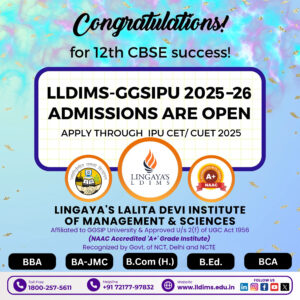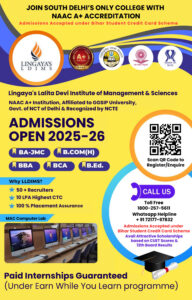Are you passionate about storytelling, eager to explore the dynamic world of media, and looking for a launchpad for your creative career? Look no further! Lingaya’s Lalita Devi Institute of Management and Sciences offers a comprehensive Bachelor of Arts in Journalism and Mass Communication (BAJMC) program designed to equip you with the skills and knowledge needed to thrive in today’s media landscape. 1. What is BAJMC, and why should I choose this course at LLDIMS? BA(JMC) program at LLDIMS is a 4-year degree in affiliation with GGSIPU – Students build a skillset to pursue career in journalism and mass communication.. At LLDIMS, we go beyond textbook learning. Our program emphasizes practical experience, industry exposure, and a holistic approach to media education. You’ll learn from experienced faculty, work on real-world projects, and gain hands-on experience in our state-of-the-art media labs. LLDIMS fosters a creative and collaborative environment that encourages innovation and critical thinking. 2. What is the eligibility criteria for BAJMC admission at LLDIMS? BAJMC eligibility generally requires completing 10+2 from a recognized board with a minimum of 50-60% aggregate marks. Additionally, candidates must clear either the CET or CUET entrance exam. 3. How can I apply for BAJMC at LLDIMS? LLDIMS BAJMC admissions involve applying through the GGSIPU website, submitting required documents, and paying the application fee. Candidates must then take either the CET or CUET entrance exam. Following result declaration, shortlisted candidates attend university counseling, where they select LLDIMS as their preferred college, verify documents, and pay the admission fee to secure their seat. 4. What is the fee structure for BAJMC at LLDIMS? The BA(JMC) course at LLDIMS has an estimated fee structure between INR 1,20,000 to INR 1,50,000 per year. The fee structure details are available on our official website and can also be obtained by contacting our admission office. We strive to offer competitive fees and value-driven education. 5. What are the career opportunities after completing BAJMC from LLDIMS? A BAJMC degree opens up a plethora of career opportunities in various media sectors, including: * Journalism (Print, Broadcast, Digital) * Public Relations * Advertising * Content Writing * Film Production * Event Management * Digital Marketing * Radio Jockeying * Television Production 6. Does LLDIMS offer scholarships or financial aid for BAJMC students? LLDIMS recognizes academic excellence and provides scholarships to deserving students based on merit. Please contact our admission office for detailed information on scholarship criteria and availability. 7. What facilities does LLDIMS provide for BAJMC students? We offer a range of modern facilities to enhance your learning experience, including: * State-of-the-art media labs * Well-equipped studios * Computer labs with the latest software * A well-stocked library * Wi-Fi enabled campus * Practical training workshops. 8. Is an entrance exam required for BAJMC admission at LLDIMS? The admission process may vary depending on the university guidelines. Please contact the BAJMC admission office for the most current information regarding entrance exams. 9. What is the placement scenario for BAJMC students at LLDIMS? LLDIMS has a dedicated placement cell that works closely with leading media organizations to provide placement opportunities to our students. We focus on developing industry-relevant skills and fostering strong industry connections. 10. How can I get more information about BAJMC at LLDIMS? We’re here to help! For more details, you can: * Call the Admission Office: +91 88008-38255 * Email: info@lldims.org.in * Visit the Website: www.lldims.edu.in * Visit the Campus: LLDIMS, Mandi Hills, Near Chhatarpur Metro Station Your Media Career Starts Here! At LLDIMS, we believe in nurturing talent and empowering students to become successful media professionals. Join our vibrant community and embark on a rewarding journey in the world of journalism and mass communication. We look forward to welcoming you to LLDIMS!





